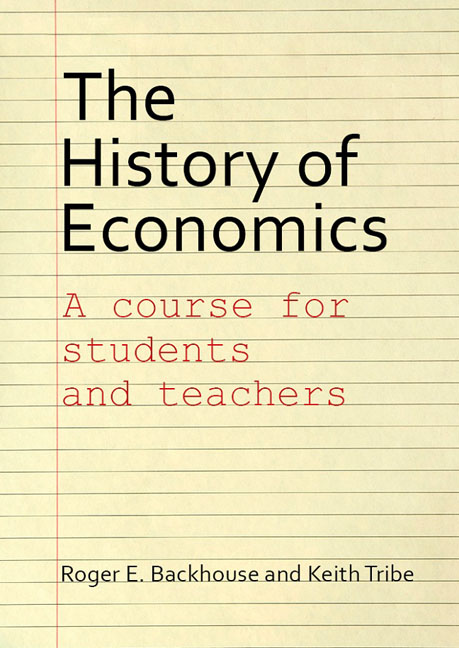Book contents
- Frontmatter
- Contents
- Introduction
- Lecture 1 Commerce, Wealth and Power: The Disputed Foundations of the Strength of a Nation
- Lecture 2 Natural Order, Physiocracy and Reform
- Lecture 3 Adam Smith I: Outline of a Project
- Lecture 4 Adam Smith II: The Two Texts
- Lecture 5 The Political Economy of Malthus and Ricardo
- Lecture 6 Political Economy in Continental Europe and the United States
- Lecture 7 Political Economy, Philosophic Radicalism and John Stuart Mill
- Lecture 8 Popular Political Economy: List, Carey, Bastiat and George
- Lecture 9 Radical Political Economy: Marx and His Sources
- Lecture 10 Marginalism and Subjectivism: Jevons and Edgeworth
- Lecture 11 From Political Economy to Economics
- Lecture 12 Alfred Marshall’s Project
- Lecture 13 Markets and Welfare after Marshall
- Lecture 14 Monetary Economics
- Lecture 15 The Rise of Mathematical Economics
- Lecture 16 Robbins’s Essay and the Definition of Economics
- Lecture 17 John Maynard Keynes
- Lecture 18 Quantitative Economics
- Lecture 19 The Keynesian Revolution
- Lecture 20 Modern Macroeconomics
- Lecture 21 Inflation and the Phillips Curve
- Lecture 22 Popular Economics
- Lecture 23 Economics and Policy
- Lecture 24 Ideology and Place
- Index
Lecture 20 - Modern Macroeconomics
Published online by Cambridge University Press: 09 August 2023
- Frontmatter
- Contents
- Introduction
- Lecture 1 Commerce, Wealth and Power: The Disputed Foundations of the Strength of a Nation
- Lecture 2 Natural Order, Physiocracy and Reform
- Lecture 3 Adam Smith I: Outline of a Project
- Lecture 4 Adam Smith II: The Two Texts
- Lecture 5 The Political Economy of Malthus and Ricardo
- Lecture 6 Political Economy in Continental Europe and the United States
- Lecture 7 Political Economy, Philosophic Radicalism and John Stuart Mill
- Lecture 8 Popular Political Economy: List, Carey, Bastiat and George
- Lecture 9 Radical Political Economy: Marx and His Sources
- Lecture 10 Marginalism and Subjectivism: Jevons and Edgeworth
- Lecture 11 From Political Economy to Economics
- Lecture 12 Alfred Marshall’s Project
- Lecture 13 Markets and Welfare after Marshall
- Lecture 14 Monetary Economics
- Lecture 15 The Rise of Mathematical Economics
- Lecture 16 Robbins’s Essay and the Definition of Economics
- Lecture 17 John Maynard Keynes
- Lecture 18 Quantitative Economics
- Lecture 19 The Keynesian Revolution
- Lecture 20 Modern Macroeconomics
- Lecture 21 Inflation and the Phillips Curve
- Lecture 22 Popular Economics
- Lecture 23 Economics and Policy
- Lecture 24 Ideology and Place
- Index
Summary
Aims of the lecture
1. To outline the main phases in the development of macroeconomics since the Second World War.
2. To explain how macroeconomists conceived their subject in what was called “the age of Keynes”.
3. To explain how economists responded to the dramatic events of the 1970s.
Bibliography
The reading list for this lecture is fairly short, though two of the items are very substantial. The early history has already been covered in lecture 19, some of the reading for which is relevant here. It leaves out any discussion of the Phillips curve, a major part of modern macroeconomics, on the grounds that this will be discussed in detail in lecture 21.
Starting with the attempts to reinterpret Keynes in the late 1950s and 1960s, R. E. Backhouse and M. Boianovsky’s Transforming Modern Macroeconomics: The Search for Disequilibrium Microfoundations, 1956–2003 (Cambridge: Cambridge University Press, 2013) focuses on attempts to analyse economies in which markets are not in supply-and-demand equilibrium; this is contrasted with the more influential approach of assuming equilibrium, and the authors tell the story of how these two approaches evolved and eventually came together.
M. De Vroey’s A History of Macroeconomics from Keynes to Lucas and Beyond (Cambridge: Cambridge University Press, 2015) looks at the history of macroeconomics from a Lucasian perspective. This means that it shows very clearly how a post-Lucas macroeconomist is likely to view older theories, pointing out their alleged failings in an unsympathetic way. It is, however, the most comprehensive treatment of macroeconomics after Lucas. The nature of the material makes it difficult reading in places, but that is the price paid for covering material that others leave out.
Given the current emphasis on “microfoundations” and the tendency to dismiss earlier work as lacking them, K. D. Hoover’s “Microfoundational Programs” in Microfoundations Reconsidered: The Relationship of Micro and Macroeconomics in Historical Perspective, P. G. Duarte and G. T. Lima (eds) (Cheltenham: Elgar, 2012), argues that since Keynes, economists have sought microfoundations, and that this is overlooked because they approached the problem in a different way from the one that became fashionable in the 1980s.
- Type
- Chapter
- Information
- The History of EconomicsA Course for Students and Teachers, pp. 303 - 318Publisher: Agenda PublishingPrint publication year: 2017



